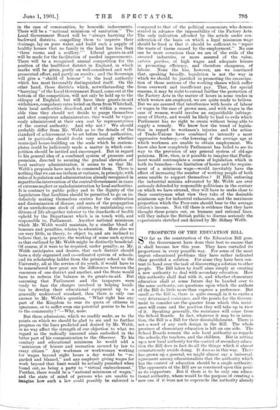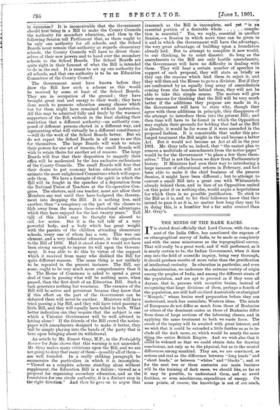PROSPECTS OF THE EDUCATION BILL.
S0 far as the construction of the Education Bill goes. the Government have done their best to ensure that it shall become law this year. They have curtailed its proportions in every possible way. For some of the most urgent educational problems they have rather indicated than provided a solution. For some they have been con- tent to hand over the task of discovering a solution to other people. The Bill taken by itself aims simply at creating a new authority to deal with secondary education. How this authority shall deal with it, and whether elementary education shall at some future day be handed over to the same authority, are questions upon which the authors of the Bill do little more than express a preference. But small as the Bill is, there is quite enough in it to excite a very determined resistance, and the points for the Govern- ment to consider are the quarter from which this resist- ance will come and the position they will take up in view of it. Speaking generally, the resistance will come from the School Boards. In fact, whatever it may be in inten- tion, the Bill is a Bill for their disestablishment. There is not a word of any such design in the Bill. The whole province of elementary education is left on one side. The School Boards remain the sole local authority as regards the schools, the teachers, and the children. But in setting up a new local authority for the control of secondary educa - tion the Bill does in fact do all the things which it almost ostentatiously avoids doing. It does so in this way. Thera has grown up a general, we might almost say a universal, agreement among educationalists that the authority which has the control of education should be a single authority. The opponents of the Bill are as convinced upon this point as its supporters. But if there is to be only one educa- tional authority, where would be the purpose of creating a new one if it were not to supersede the authority already in exist.enee ? It is inconceivable that the Government Øiuld firstbring in a Bill to make the County Councils the authority for secondary education, and then in the following-Session tell' Parliament 'that, as there ought to be only one -authority for all schools, and the School Boards must remain that-authority as regards elementary schools, the County .Councils will have to divest them- Selves of their new powers and to hand over the secondary schools to the School Boards. The School Boards are quite right in their forecast of what the Bill is intended to do in the end. It is meant to set up one authority for all schools, and that one authority is to be an Education Committee of the County Council.
The Government must have known before they drew the Bill how such a scheme as this would be received by some at least of the School Boards. They are in occupation of the ground ; they . have brought great zeal and energy to their work ; they have done much to promote education among classes which but for them might have remained without instruction. All this may be admitted fully and. freely by the warmest supporters of the Bill, without in the least shaking their conviction that a different authority—an authority com- posed of different persons elected in a different way, and. rgiresenting what will virtually be a different constituency —will do the work of the School Boards better. But we do not expect the School Boards in all cases to see this for /themselves. The large Boards will wish to retain their powers for one set of reasons, the small Boards will wish to retain theirs for another set of reasons. The large Boards will fear that their disposition to magnify their office will be moderated by the less exclusive enthusiasm of the County Councils. The small Boards will fear that their desire to put economy before education will not . . animate the more enlightened Committees which will super- skle'thein. We have a foretaste of the spirit in which the gig will ,be fought in the speeches of a deputation from the National Union of Teachers at the Co-operative Con- gress. The electors, said one teacher, must not allow their Mem.bers.any rest until they have badgered the. Govern- ment into dropping the Bill. It is nothing less, said another, than." a conspiracy on the part of the classes to fah away from the masses those educational advantages Which they have enjoyed for the last twenty years." Tall tik . of this kind may be thought too absurd. to call .. for , notice. But it is the tall talk of a very powerful body, and a body which has great weight 'with the parents of the children attending elementary schools, -every one Of whom' has a vote. This was one element, and a very influential element, in the opposition to the Bill of 1896. Had it stood alone, it would. not have been strong enough to impose its will upon the Govern- ment. It was able to do this by virtue of the support which it .received from many who disliked the Bill for quite different reasons. The .same thing is not unlikely to be repeated in the present instance. The Bill, say some, ought to be very much more comprehensive than it is.' The House of Commons is asked to spend a great deal of time in passing what will be nothing more, when passed, than the first draft of an Education Bill. Such a task generates nothing but weariness. The enemies of the Bill will be active and persistent because they know that if this effort on the part of the Government can be defeated there will never be another. Ministers will have tried passing a big Bill, and they will have tried passing a little Bill, and they will equally have failed in both. What better indication can they require that the subject is one Which a Unionist Government will be well advised in letting alone? If the friends of the Bill crowd the notice- paper with amendments designed to make it better, they will be simply *playing into the hands of the party that is 'bent upon bringing.about its withdrawal.
An article by Mr. Ernest Gray, M.P., in the Fortnightly Review for June shows that this warning is not unneeded. Mr. Gray makes many criticisms upon the Bill, and. we are not going to deny that many of them—possibly all of them— are well founded. In a really striking paragraph he enumerates the particulars in which it is incomplete. "Viewed as a complete scheme standing alone without supplement, the Education Bill is a failure : viewed. as a proposal for organising secondary education, and. as the fOundatien xfor one single authority, it is a distinct step in the right direction." And then he gcies on to argue that inasmuch as the Bill is incomplete, and yet "ii an essential portion of a desirable whole comple- tion is essential." Yes, we reply, essential in another Session,—a Session in which more time can be given to it and in which the Government will have the advantage, the very great advantage, of building upon a foundation already laid. But to attempt to complete it now would, to our thinking, be to court disaster. So long as the amendments to the Bill are only hostile amendments, the Government will have no difficulty in dealing with them. They will hear a certain number of speeches in support of each proposal, they will state as briefly as they can the reasons which lead them to reject it, and. they will then ask the House to go to a division. But if they are confronted by an equally long array of amendments coming from the benches behind them, they will not be able to take this simple course. The movers will give their reasons for thinking that the Bill will be very much better if the additions they propose are made in it ; the Government will have to state why, though they agree with these additions in principle, they disapprove of the attempt to introduce them into the present Bill; and then time will have to be found in which the Opposition may explain their grounds for holding that bad as the Bill is already, it would be far worse if it were amended. in the proposed fashion. It is conceivable that under this pro- longed treatment the Bill might in the end. become a better Act. But it would not become an Act at all in the year 1901. Mr. Gray tells us, indeed, that "the easiest plan to remove a multitude of amendments from the notice-paper" would be for the Government "to place a few there them- selves." That is not the lesson we draw from Parliamentary history. If Ministers had seen their way to introducing a large measure of educational reform in February, and had been able to make it the chief business of the present Session, it might have been different ; but to attempt to convert a small Bill into a 'great one with Whitsuntide already behind them, and in face of an Opposition united on this point if on nothing else, would argue a hopefulness for which there is no possible justification. To stick to the Bill as it is, and to let their followers know that they intend to pass it as it is, no matter how long they may be in doing this, is a humbler but a far safer counsel than Mr. Gray's.







































 Previous page
Previous page